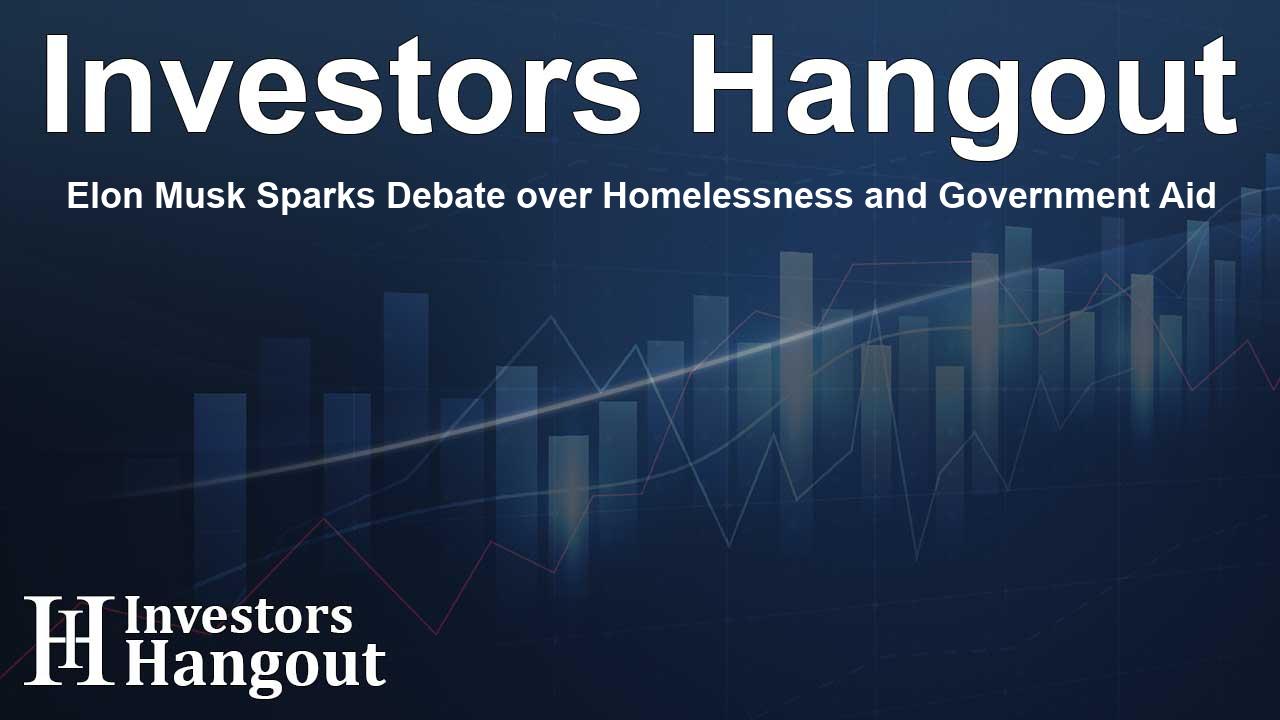Elon Musk Sparks Debate over Homelessness and Government Aid

Musk’s Controversial Claims on Homelessness
In a recent outburst, Elon Musk has stirred a significant conversation about the term "homelessness". Using his platform X, he stated, "In most cases, the word ‘homeless' is a lie. It's usually a propaganda word for violent drug addicts with severe mental illness." This statement has not only caught the attention of his followers but has also raised eyebrows among advocates for the homeless.
Response to Criticism
The tech mogul's comments came in the wake of a post by Jeremy Kauffman, which outlined the struggles within housing programs, particularly in urban areas. The post highlighted alarming issues such as violence, drug addiction, and other social problems faced by those living without stable housing. Musk agreed with Kauffman's sentiments and has often expressed skepticism regarding the effectiveness of governmental aid.
Complex Nature of Homelessness
During a pivotal interview, Musk emphasized that homelessness is often misrepresented. He argued that it does not merely involve individuals facing temporary setbacks but encompasses more profound societal issues, such as substance abuse and mental health crises. Musk elaborated, stating that expecting quick solutions like employment opportunities may overlook the complexities involved.
Financial Incentives Behind Homelessness Programs
One of Musk's more controversial assertions involves financial incentives affecting homelessness programs. He criticized non-governmental organizations (NGOs) that operate under a profit motive mentioning, "The ‘save the homeless' NGOs are often paid based on how many homeless people are on the streets, thus creating a strong financial incentive for them to maximize the number of homeless people and never actually solve the problem!" This, according to Musk, hinders genuine efforts toward resolving homelessness.
Critics Voice Their Opinions
Musk's perspective has stirred a fair amount of backlash. Critics describe his views as tone-deaf and detached from reality. Jesse Rabinowitz from a leading homelessness advocacy group remarked that it highlights Musk's disconnect from the struggles many face daily, including affording basic necessities like food and rent.
Do the Wealthy Have a Role?
Some argue that billionaires like Musk possess the resources to genuinely impact homelessness. With his extensive wealth, they believe he could choose proactive measures instead of merely critiquing existing solutions. The call for action from high-profile individuals emphasizes the expectation that they should leverage their influence toward positive resolutions.
The Broader Picture of Homelessness
Research indicates that the narrative surrounding homelessness is severely oversimplified. Government statistics reveal that over 650,000 individuals face homelessness on any given night, with a notable percentage being children. Far from Musk's depiction of drug addicts, many are working individuals struggling to meet soaring housing costs amidst stagnant wages.
Rallying for Change
Musk's declarations have transcended mere commentary; they serve as a rallying cry advocating for substantial reform in homelessness policies. He urges a reallocation of resources toward better efficiency in how the federal government addresses this crisis. However, many warn that ignoring systemic issues while pointing fingers is ultimately detrimental.”
Conclusion
As Musk's comments continue to resonate, they ignite discussions on the complexities of homelessness and the adequacy of current relief efforts. While the views he presents are contested, they undeniably stir attention toward an issue that requires thoughtful dialogue and comprehensive solutions. Critics urge that understanding the root causes of homelessness is essential before advocating for sweeping changes to existing programs.
Frequently Asked Questions
What did Elon Musk say about homelessness?
Elon Musk called the term 'homeless' misleading, suggesting it often refers to individuals with severe issues related to addiction and mental health.
How did Musk relate homelessness to financial incentives?
Musk argued that some NGOs may perpetuate homelessness for financial gain since their funding depends on the number of unhoused individuals.
What are the statistics on homelessness in the U.S.?
Over 650,000 Americans are estimated to face homelessness on any given night, with many being full-time workers struggling with housing costs.
Why are Musk's comments controversial?
Many view Musk's perspective as oversimplifying a complex issue and being disconnected from the real challenges faced by the homeless population.
What is the current debate around homeless assistance programs?
The debate revolves around whether current programs effectively address root causes of homelessness or merely serve as temporary fixes while incentivizing the status quo.
About The Author
Contact Owen Jenkins privately here. Or send an email with ATTN: Owen Jenkins as the subject to contact@investorshangout.com.
About Investors Hangout
Investors Hangout is a leading online stock forum for financial discussion and learning, offering a wide range of free tools and resources. It draws in traders of all levels, who exchange market knowledge, investigate trading tactics, and keep an eye on industry developments in real time. Featuring financial articles, stock message boards, quotes, charts, company profiles, and live news updates. Through cooperative learning and a wealth of informational resources, it helps users from novices creating their first portfolios to experts honing their techniques. Join Investors Hangout today: https://investorshangout.com/
The content of this article is based on factual, publicly available information and does not represent legal, financial, or investment advice. Investors Hangout does not offer financial advice, and the author is not a licensed financial advisor. Consult a qualified advisor before making any financial or investment decisions based on this article. This article should not be considered advice to purchase, sell, or hold any securities or other investments. If any of the material provided here is inaccurate, please contact us for corrections.
